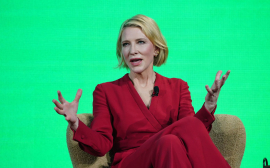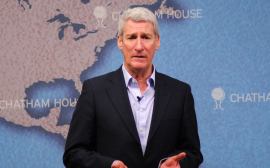- 1. Netflix

SARANDOS
Theodore
Chief executive officer of Netflix
Organization: Netflix
Profession: Chief Executive Officer
Biography
Theodore Anthony Sarandos Jr. is an American businessman who is the co-chief executive officer of Netflix, Inc.
Netflix
After meeting Netflix CEO Reed Hastings in 1999, Sarandos joined Netflix in 2000. He serves as its co-chief executive officer. Before that, he was the company's chief content officer, overseeing Netflix's original programming and entertainment efforts. He is also a member of the Peabody Awards board of directors, which is presented by the University of Georgia's Henry W. Grady College of Journalism and Mass Communication, and the Chair of the Board of Trustees for the Academy Museum of Motion Pictures. He is also a trustee of the American Film Institute and sits on the boards of Exploring The Arts and Spotify. In 2013, Sarandos was named one of Time's 100 Most Influential People.
Sarandos was responsible for initiating the first round of original programming at Netflix, starting with Lilyhammer, and then continuing with the breakout David Fincher series starring Kevin Spacey, House of Cards. Beginning with House of Cards, which was bought for $100 million in a March 2011 deal, Sarandos created the model where Netflix purchases multiple seasons of shows without pilot orders. Sarandos sees the focus as being on subscriber growth as a reflection of revenue health over ratings. This has since changed as Netflix has recently decided to initiate an Ad-Supported model which allows the users to pay a lower price but have advertisements on their site.
Sarandos uses algorithms at Netflix to predict what programs viewers will want to watch prior to producing them. His personal algorithm focuses on 30% judgement (as a highest priority), with 70% focused on a base of data. He also said that the focus is on the audience, and that there is no programming grid – or appointment linear-based television – that is typically used by traditional TV networks. Barometers of success are if the audience completes watching the show, the timeframe within which they finish watching a series if there is social media buzz by critics and fans. Sarandos said that the preference is for a show to run for multiple seasons and build a fan base. Sarandos believes the model allows the viewer to be in control, and to watch only the content they enjoy. The more serialized the show is, the longer the revenue stream. Sarandos sees cost per hour basis as greater the more total run time there is across the lifetime of a show, as it is often not cost savings to produce less original content once production is underway. He said Netflix aggregates audiences over a very long period of time, where Netflix can tell if a show will be successful by using a regression models that tells Netflix, based on the first hour of viewing, how successful the show will be over the life of its license.
Sarandos has been outspoken about discarding or not holding important traditional network models. Although historically a big broadcast TV fan, he describes the model as now becoming archaic. Sarandos said he sees the new model as a way to prioritize the needs and desires of the consumer. International reach and long tail, niche appeal is also an important part of the business model. The spend is typically a large upfront payment, with no back-end fees to talent and creators, especially of original content that Netflix owns. Sarandos said that he sees the Netflix brand as being based on personalization, that it was a deliberate choice on the part of Netflix to focus on providing diverse content that would appeal to the tastes of a broad base of viewers – one that would not be focused on a marquee show that Netflix would be known for, but quality shows that would appeal to different audiences.
Sarandos has said that he sees Netflix as a digital product, where the balance between distributing physical bits of content versus streaming digital content would be cheaper as both broadband and Netflix grew. The shift away from the DVD business came from this evaluation of new model focused on streaming and includes original programming, which is one of the main responsibilities of Sarandos' work at Netflix. During the 2016 Television Critics Association presentation, Sarandos said he expects the amount Netflix spends on original programming to rise considerably.
In 2020, Sarandos received the Producers Guild of America Milestone Award. That same year, Netflix announced Sarandos as its co-chief executive officer and member of the company's board of directors. Hastings had referred to Sarandos as his partner in running Netflix in previous years, specifically on film and TV production.
In 2022, Sarandos was named "Entertainment Person of the Year" at the Cannes Lions International Festival of Creativity in recognition for his work in entertainment marketing and communications. On January 19, 2023, Hastings stepped down as co-CEO to become Executive Chairman. Greg Peters was named co-CEO alongside Sarandos.











































